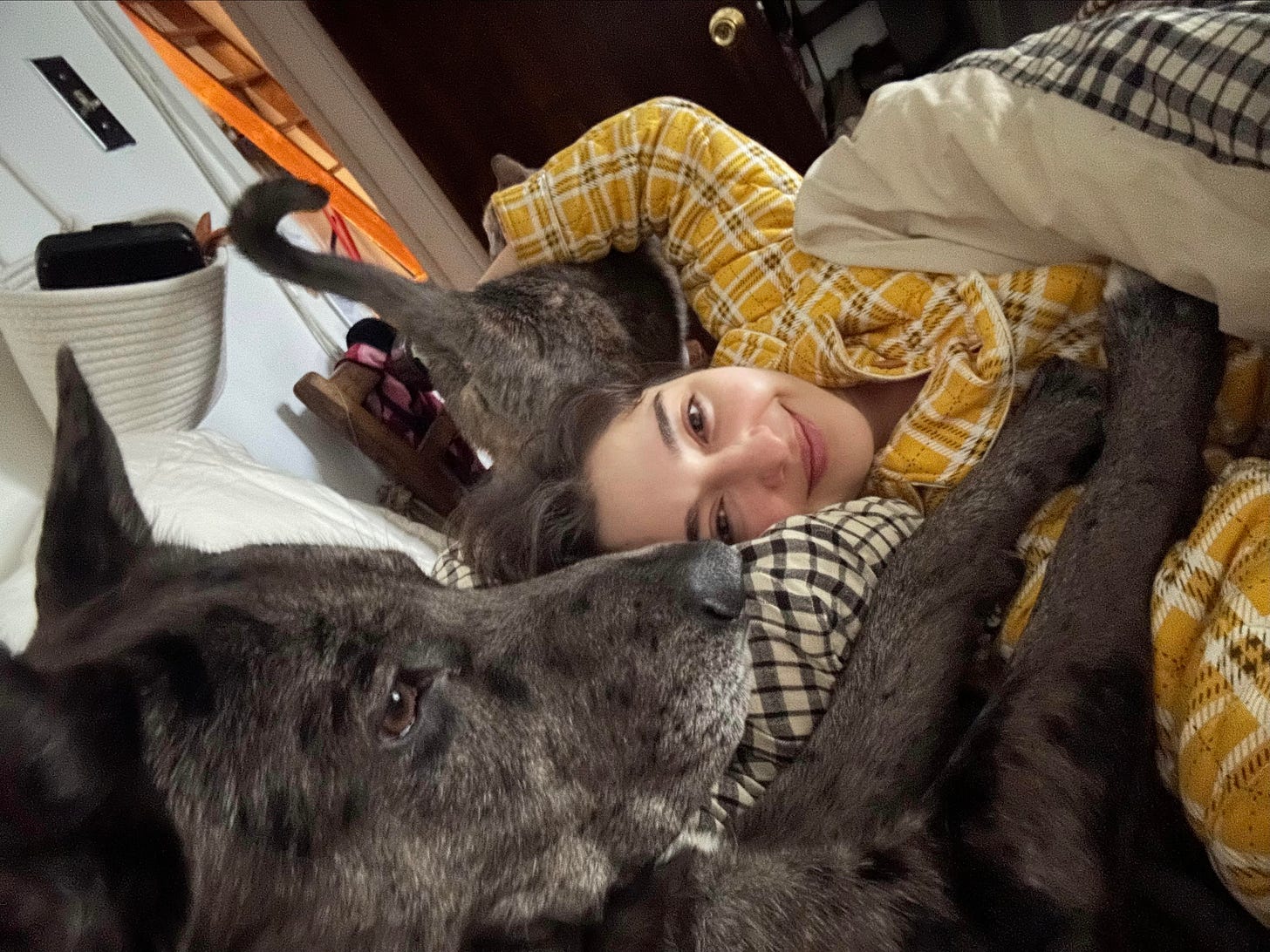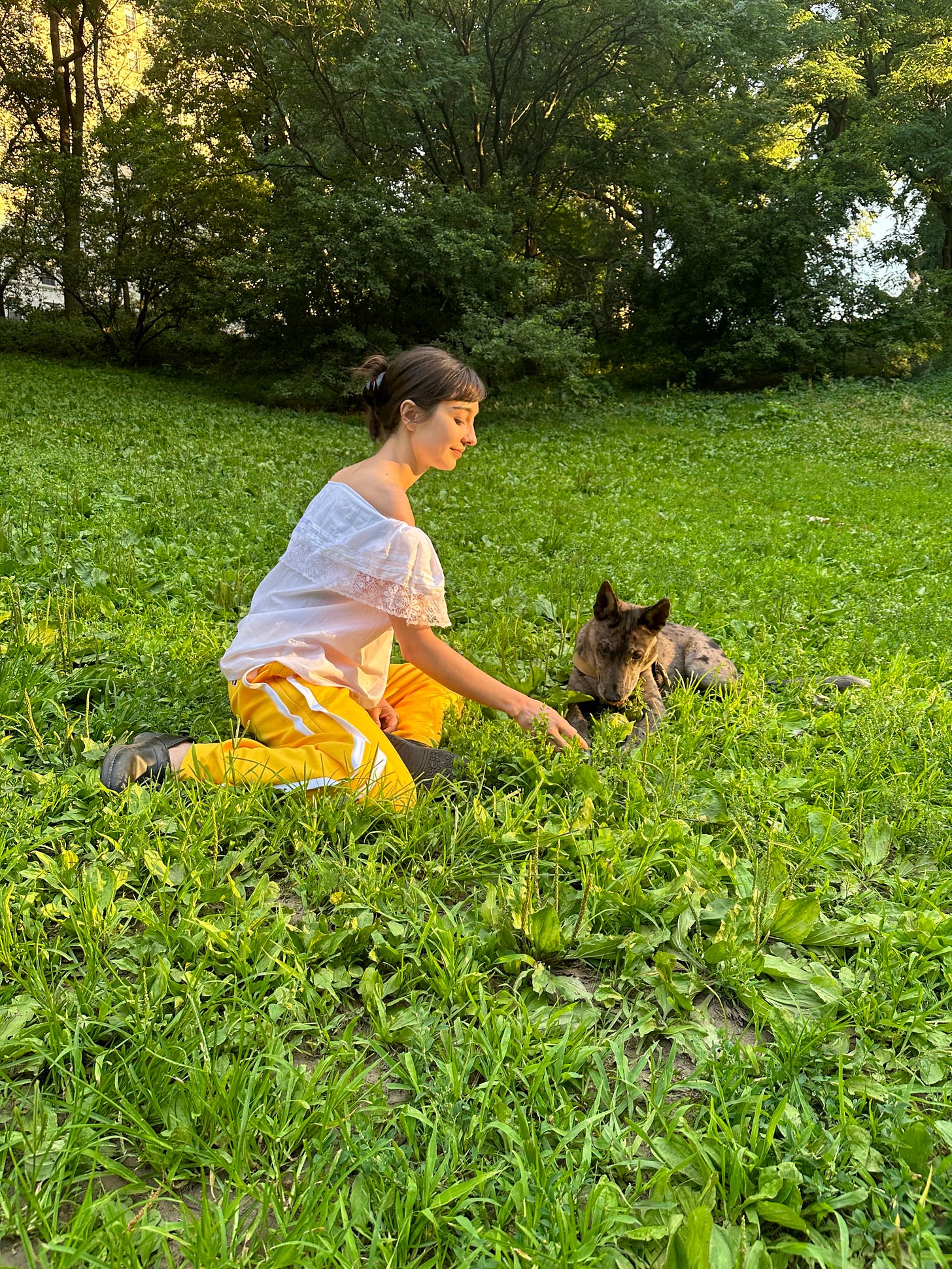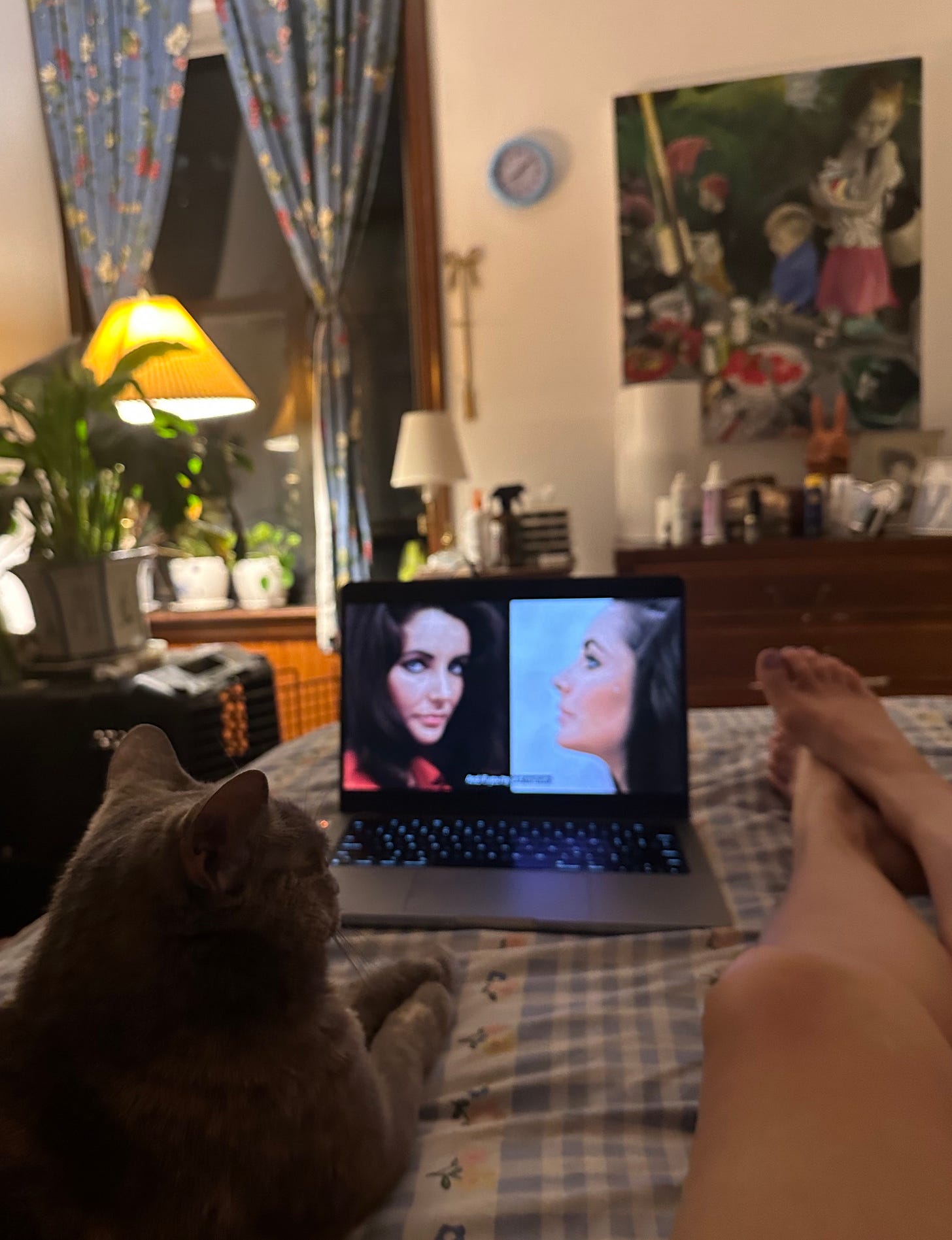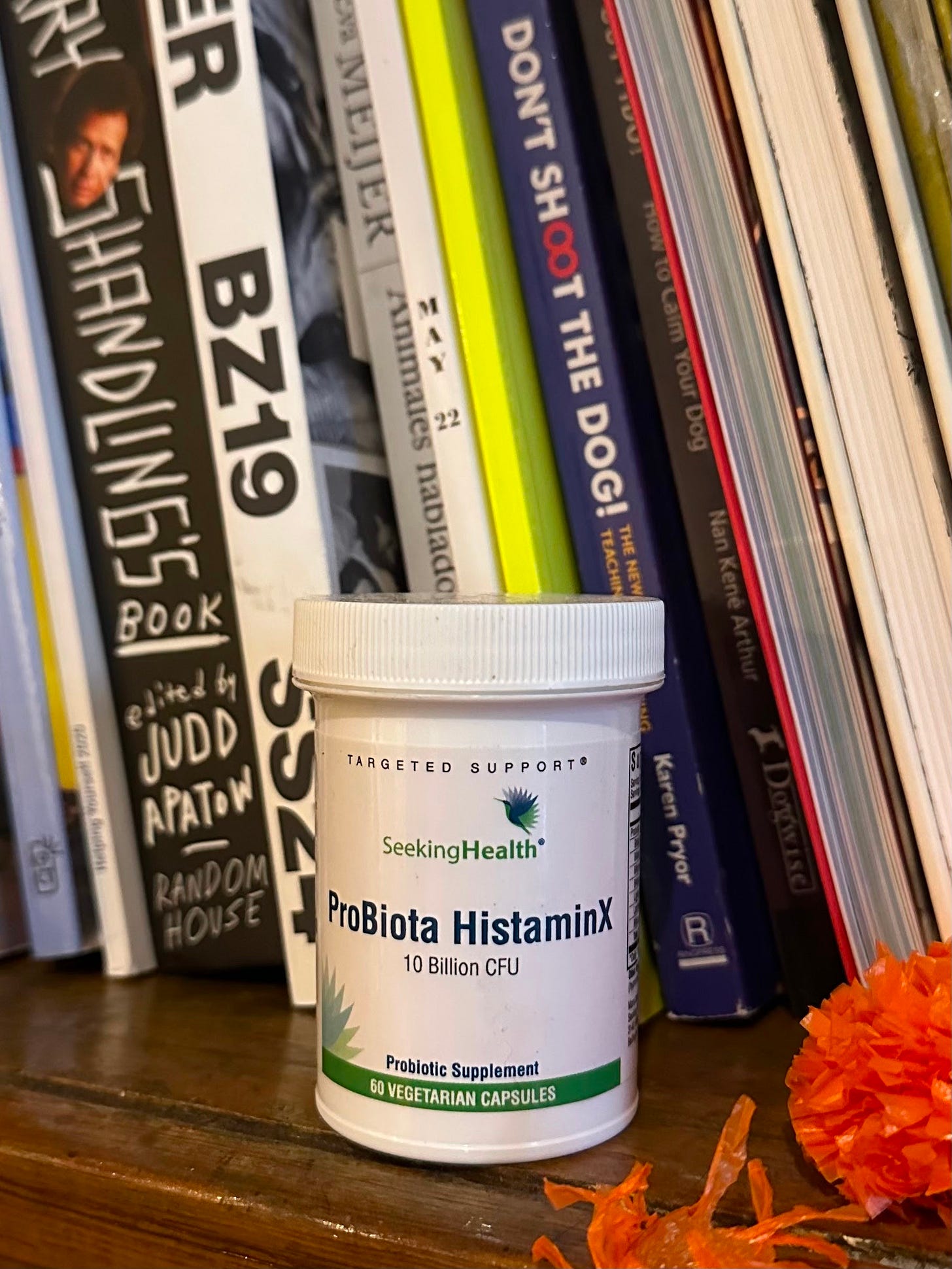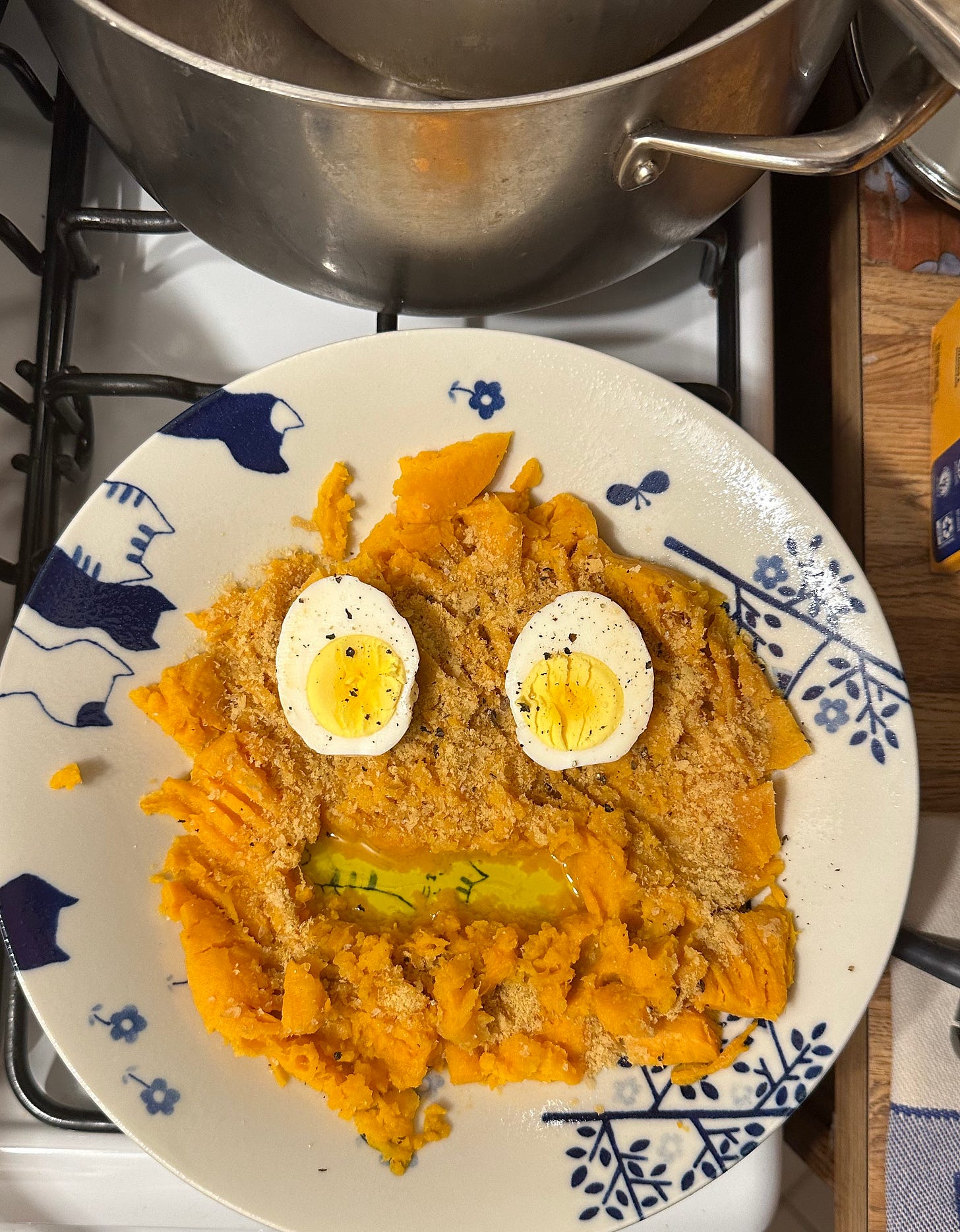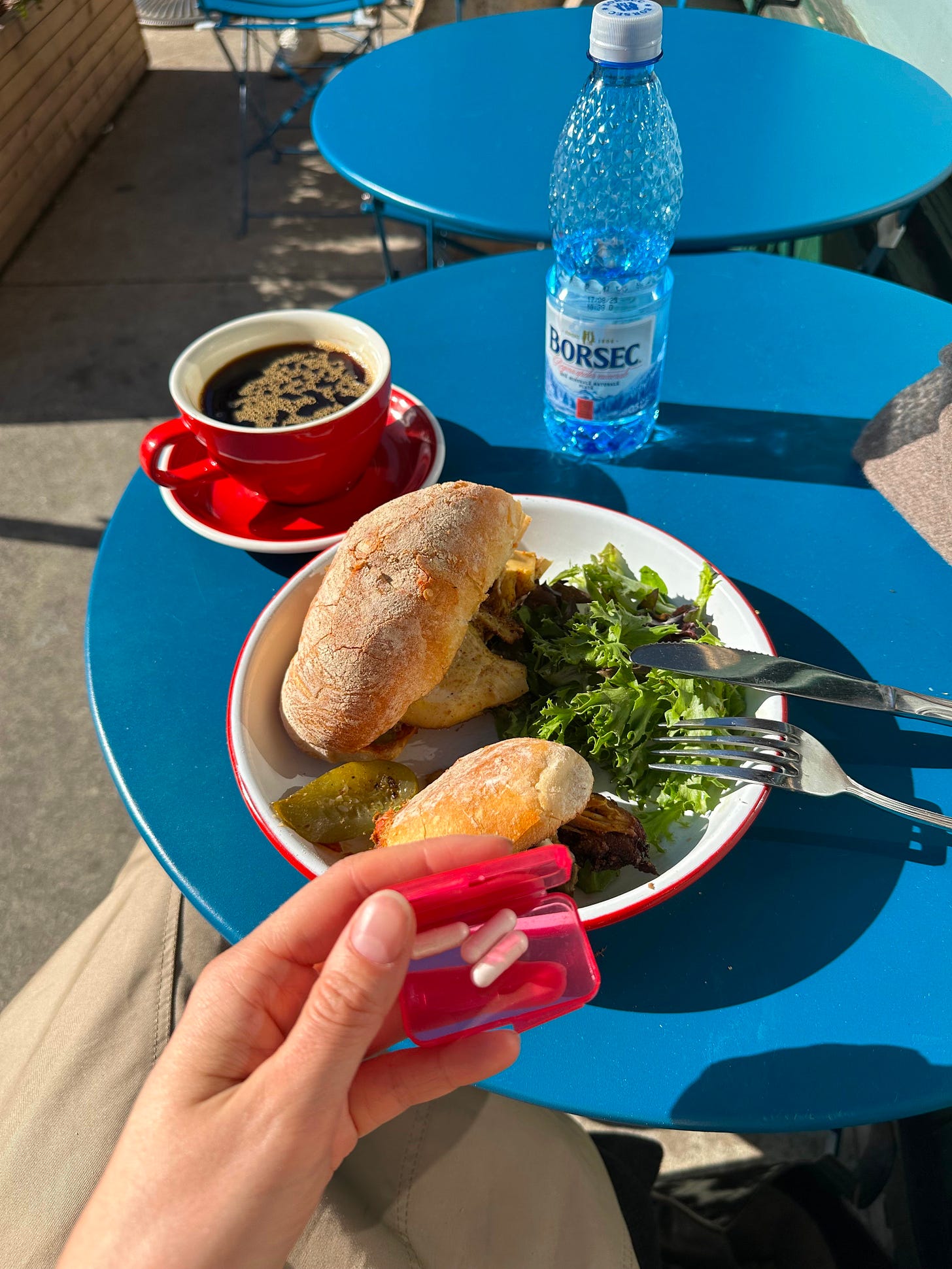#32: Amalia Ulman
"I know this overall routine isn’t 'optimized,' but my cat likes it."
Amalia is an artist, filmmaker, and water sommelier. “I tend to make work about and become attracted to things that I find either unsettling, terrifying, or unpleasant,” she wrote in a 2015 diary from Pyongyang. Her second feature film, Magic Farm, will premiere at Sundance next year.
At a glance…
Location: New York
Big 3: Capriquarius (I share a birthday with Lynch and Fellini)
What does health, or being healthy, mean to you?
Not being in physical pain, feeling clear-headed, sharp. That’s how I imagine heaven to feel.
How would you describe your current lifestyle?
My whole life revolves around avoiding feeling disabled. Both my legs were permanently damaged in an accident and I’m autistic, so I plan my days in advance so as to not feel disabled in the near future. Sometimes it is hard because my work requires me to be very available and spontaneous — and that’s when I need to rely on pharmaceuticals, which I’d rather not.
(By the way, I’m not against drugs for any reason other than the fact that drugs don’t let you listen to your body. Painkillers help push through activities you should be avoiding and putting a strain on the body that’s suffered later. Drugs are amazing but unfortunately we are not at a point where drugs don’t come with side effects.)
My animals have always helped me a lot and my service dog has changed my life. He is young and still in training, but he has given my life a structure that I’m very grateful for. Suffering from pain in my legs has sometimes made it hard for me to leave the house. When I’m with him, I feel the pain but not the suffering. There’s a big difference between the two. Temple Grandin explains this very well in her book Animals in Translation. Variety, my dog, makes me very happy and serotonin/dopamine are both neurotransmitters that play a role in pain modulation. I still have metal in my legs but thanks to the joy he brings to my life and my daily routines, I don’t notice it as much. That helps me be more physically active, fulfilled, and happy.
How do you start and end your days?
How to start the day has always been an issue for me. I have a nocturnal circadian rhythm which has always made it hard to conform to a culture that celebrate early risers. In the mornings I’m a bit dimwitted so I use that time for errands and manual labour. It’s at night when I feel as if my brain is twice its size, when I feel like a genius that must devour books and films and make up for half a day of catatonia.
My morning routine consists of getting up, turning on the radio, brewing coffee and sitting in the armchair with my cat, Gemi, for about an hour. During this time Variety is out with his walker — dog trainers all say walkers hinder training, but I hire one for the mornings because that’s when my leg pain is usually the worst. I know this overall routine isn’t “optimized” and that I should be instead stretching and drinking lemon water, but my cat likes it. After that hour has passed and my dog returns from his walk, the day begins.
I often don’t think of days and nights to be in the same 24 hours. Since I’m autistic and have a physical disability, I like to organize my days in the following way: one day is a “day” and the next day is a “night.” By this I mean that I try to alternate ON days and OFF days, scheduling most activities (social, physical) to one day and stay in my home and neighborhood the next: running small errands, doing physical therapy, being non-verbal, reading and hanging with the animals in silence. That system keeps me healthy and balanced. Of course, there are times when I have to be ON for many days in a row (like a being on a movie set!), but that’s risky: pain in my legs can accumulate to the point of being bedridden, and I might feel autistic burnout from overexerting myself socially. Drugs are helpful in emergencies, but I don’t like relying on that for too long.
Was there a specific moment in life that made you change your approach to health, or become more conscious generally?
Yes, definitely the accident that left me permanently disabled. I was only 24 when it happened, and I had to deal with a near-death experience and learn to walk again, at such a young age. The worst of it, though, was being 24 and having the physical issues of a 80 year old… Limping, having a cane, and being in pain added new layers to the challenge of being autistic and spending all my time in public trying to pass as “normal.” If I already had a hard time relating to people my age, the accident made it even worse… But this experience has given me a very non-linear understanding of time and aging which I’m grateful for. I see time as circular and cyclical instead.
What’s your relationship to self-healing?
As a woman I started mistrusting medical professionals early on. I remember being a preteen and always feeling terrible and suffering from sensory overload, dizziness, allergies, weakness, fatigue, migraines, stomach aches, etc. I would go to the doctor a lot and they would just shrug.
Now I realize that many of these symptoms have to do with autism, which I was not diagnosed until I was an adult, in part because doctors perceive autism as a male-coded condition. Also, when I was in my twenties, I lost my period for about six months, probably due to stress and malnourishment. That’s clearly concerning, but I remember going to the family gynecologist (a man) and him saying that it was “totally normal.” Of course it wasn’t normal (or shouldn’t be!). It was then that I started doing my own research and reading medical papers. I still go to the doctor when I have issues, but I take whatever they say with a grain of salt. I go to doctors for prescription drugs, X-rays, blood tests, MRIs, etc., but then I make sure to read all the results myself, ask for second opinions, do my own research and make my own decisions.
Do you have any guiding principles?
All bodies are different. Whatever health fad that works for some is terrible for others. For example, I find I don’t benefit that much from turmeric, but there was a huge trend a few years ago when every health drink had turmeric in it. The other trend that turned out to be actually terrible for my body was fermentation-heavy diets, full of products like kimchi and kefir. I’m histamine intolerant, so for me the bad of fermentation outweighs the good. (There are interesting recent studies that explore the correlation of histamine intolerance and Premenstrual Dysphoric Disorder [PMDD], particular among women with autism.) So yes, things are good or bad depending on the body ingesting them.
Where do you look to for information or advice?
There’s not a particular person I follow (although I appreciate Bryan Johnson’s experiments). One thing I do is compare people’s experiences on Reddit or personal blogs. It’s interesting how important the internet has been for women’s health, especially for things like PCOS (Polycystic Ovary Syndrome). I don’t have PCOS but I’ve had hormonal imbalances in the past, and whenever I’ve gone to a doctor with issues such as being in pain, having my hair fall off, teeth chipping, whatever, they do very generalized tests where the results look “OK” even though things clearly aren’t. When that inevitably happens, the most useful things for me have been very detailed blogs and message boards from women doing their own trials-and-errors and sharing resources. I hate it when this happens because it is very tedious to have to read so many blogs and medical papers myself. But that’s how I’ve always found out what’s really going on.
Many people think that being autistic just means being shy, but it actually comes with a set of physical health issues that are all interconnected. I have Raynaud’s syndrome, hyperextension, gut issues, histamine intolerances, poor balance and motor control… and all of that is very common. The problem is that most general practitioners aren’t well-versed in this, so autism is often relegated to psychiatry only. Usually I combine what the doctors say with lengthy sessions of research. And so far it has worked! I feel better now than I felt when I was 21.
What’s your perfect meal?
A perfect meal is something that I can digest well. This brings us back to histamine intolerance, which is something I only learned about quite recently, but is maybe the most valuable dietary lesson I have learned in my entire life.
I’m very lazy in the kitchen and used to eat a lot of canned fish, which is very normal in Spain. I would eat a lot of bread and tuna or clams or sardines…you name it. At the same time, ever since I was in my twenties, I’ve suffered from horribly debilitating premenstrual dysphoric disorder (PMDD). It’s one thing to be PMS, but it’s another thing entirely to suffer from PMDD. PMDD is hardcore. It can make you want to kill yourself everyday for three weeks out of a month. And I’ve dealt with this, on and off, for decades. This has obviously affected my work a lot, causing me to lie to colleagues and friends, telling them I was “busy, working” when I actually just didn’t feel the strength necessary to be alive. I always knew that it was a chemical imbalance because I never felt “objectively” sad. I just felt insanely depressed “for no reason.” I always felt stupid about it and tried to balance it out by reducing stress, eating healthy, exercising…
A few months ago, the symptoms were terrible, so I started researching PMDD again. And just like that the algorithm pushed a video of a female gynecologist saying, “Are you autistic and suffer from PMDD?” It went on to explain how many autistic women suffer from PMDD and also have histamine intolerances. I know it sounds silly that an algorithm-pushed video put me on to this, but I read up on it and everything started making sense. When I was a child, I wasn’t necessarily allergic to anything (I got all the tests done, they were always negative), but I had strong allergy symptoms daily. The doctors didn’t know what to do and prescribed me Zyrtec, which I took every morning before going to school for years.
Your body releases histamine before and during your period to aid in uterine contraction. This increased histamine may not cause a major issue for everyone. However, if you already have histamine intolerance or consume too many high-histamine foods during this time, it can become too much for your body. The higher histamine levels can lead to cramps and other PMS symptoms. Moreover, many symptoms of PMS and symptoms of PMDD, including fatigue, mood swings, anxiety, and brain fog, resemble symptoms of histamine intolerance. Since symptoms can overlap, symptoms of histamine intolerance can amplify similar symptoms of PMS.
And guess what: excess histamine can cause joint pain, musculoskeletal or connective tissue pain (fibromyalgia)…
At the time of my discovery my diet consisted mostly of high histamine foods. For breakfast, I was drinking yerba mate (the national tea of my native Argentina, but alas) and eating eggs and mushrooms covered in nutritional yeast with a big side of kimchi. I was drinking kefir, eating avocados, and making A LOT of tuna sandwiches. When I say a lot, I mean it. I might have had tuna sandwiches daily for years…
Keep reading with a 7-day free trial
Subscribe to Health Gossip to keep reading this post and get 7 days of free access to the full post archives.



